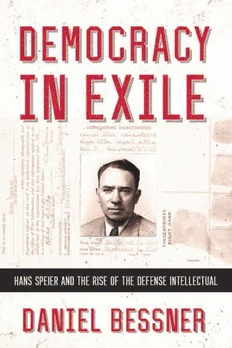
Democracy in exile: Hans Speier and the rise of the defenseintellectual PDF
Preview Democracy in exile: Hans Speier and the rise of the defenseintellectual
DEMOCRACY IN EXILE A volume in the series The United States in the World E dited by Mark Philip Bradley, David C. Engerman, Amy S. Greenberg, and Paul A. Kramer A list of titles in this series is available at cornellpress.cornell.edu. DEMOCRACY IN EXILE Hans Speier and the Rise of the Defense Intellectual Daniel Bessner C ornell University Press I thaca and London C opyright © 2018 by Cornell University A ll rights reserved. Except for brief quotations in a review, this book, or parts thereof, must not be reproduced in any form without permission in writing from the publisher. For information, address Cornell University Press, Sage House, 512 East State Street, Ithaca, New York 14850. F irst published 2018 by Cornell University Press P rinted in the United States of America L ibrary of Congress Cataloging-in-Publication Data Names: Bessner, Daniel, 1984– author. Title: Democracy in exile : Hans Speier and the rise of the defense intellectual / Daniel Bessner. Description: Ithaca : Cornell University Press, 2018. | Series: The United States in the world | Includes bibliographical references and index. Identifi ers: LCCN 2017041352 (print) | LCCN 2017043061 (ebook) | ISBN 9781501709395 (pdf) | ISBN 9781501712036 (epub/mobi) | ISBN 9780801453038 | ISBN 9780801453038 (print : alk. paper) Subjects: LCSH: Speier, Hans. | Sociologists—United States—Biography. | Sociologists—Germany—Biography. | Exiles—Germany— Biography. | National security—United States—History— 20th century. | United States—Foreign relations—1945–1989. | United States—Intellectual life—20th century. Classifi cation: LCC HM479.S (ebook) | LCC HM479.S B47 2018 (print) | DDC 301.092 [B]—dc23 LC record available at https://lccn.loc.gov/2017041352 C ornell University Press strives to use environmentally responsible suppliers and materials to the fullest extent possible in the publishing of its books. Such materials include vegetable-based, low-VOC inks and acid-free papers that are recycled, totally chlorine-free, or partly composed of nonwood fi bers. For further information, visit our website at cornellpress.cornell.edu. Cover image: Hans Speier’s Offi ce of War Information identifi cation badge, 1945–1946 (courtesy of the New School for Social Research). To my parents, Jody and Glen Bessner A free-floating intelligentsia . . . is not going to show us the way out of the crisis. —Hans Speier, as recounted by Henry Kellerman, 1990 [Hans Speier was] a scholar who looked modernity in the eye and did not blink. —Ira Katznelson, 1990 Contents P reface ix A cknowledgments xi I ntroduction: Democracy, Expertise, and U.S. Foreign Policy 1 1 . Masses and Marxism in Weimar Germany 15 2 . The Social Role of the Intellectual Exile 44 3 . Public Opinion, Propaganda, and Democracy in Crisis 73 4 . Psychological Warfare in Theory and Practice 102 5 . The Making of a Defense Intellectual 126 6 . The Adviser 156 7 . The Institution Builder 177 8 . Social Science and Its Discontents 204 C onclusion: Speier, Expertise, and Democracy after 1960 225 viii Contents A bbreviations 233 A rchival and Source Abbreviations 235 N otes 237 A rchives Cited 283 I ndex 287 Preface T his book tells the story of a German-born academic who became one of the early Cold War’s most infl uential American defense intellectuals. It is a story of catastrophe, exile, and success; of rejecting youthful values for more “realistic” alternatives; of a scholar becoming an expert. It is above all a story about how an idea that we currently take for granted—that social scientists ensconced in think tanks and universities should have a voice in foreign policymaking—was institutionalized. F ew historians have heard of Hans Speier (1905–1990). He is at present what I call a “lister”—a person mentioned in lists of midcentury intellectuals (and usually toward the end). Though I cannot be certain exactly why this is the case, I have my suspicions. Speier never wrote a major book and was associated with the RAND Corporation’s Social Science Division, which has always been overshadowed by RAND’s more prominent Economics Divi- sion. Speier was bound to escape the attention of historians interested in examining intellectuals who clearly infl uenced their fi elds and disciplines of study. Unlike many in his exile cohort, including Hannah Arendt (his class- mate at Heidelberg University), Hans Morgenthau (his realist associate), and Leo Strauss (his colleague at the New School for Social Research and one
